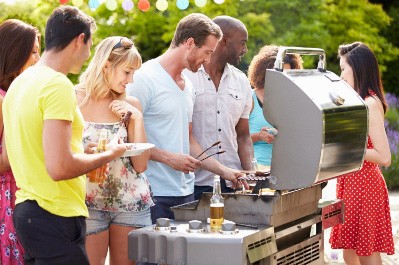Easing the Home Insurance Concerns of Grilling in Your Backyard
Whether an excuse for friends and family to gather, or simply a way to prepare quick, easy meals, grilling is a center of summertime activity. But a host of unwelcome events, such as an out-of-control fire, can put a damper on your backyard fun — and possibly prompt a home insurance claim.
“Homeowner’s insurance will cover a claim if your grill sets fire to the structures insured on your property such as a garage. If you’re renting a home, then it would only cover your belongings, but the person who owned the home or apartment building should have insurance on the structures,” says Loretta Worters, vice president of the Insurance Information Institute.
Summertime grilling danger
It turns out backyard grillers are at great risk for mishaps.
According to the U.S. Fire Administration, grill fires in backyards and on patios, decks and balconies result in an estimated $37 million in property losses each year. Nearly half of those grill fires happen during dinnertime, between 5 p.m. and 8 p.m.
The National Fire Protection Association says an average of 8,500 burns resulting from grill fires are treated in U.S. emergency rooms every year. The Fire Administration says grill fires result in an average of 10 deaths every year.

Summertime is the peak season for grill fires. The Fire Administration says 57 percent of grill fires on residential properties occur in May, June, July and August. Thirty-two percent of those fires start on patios, terraces, screened-in porches or courtyards, while an additional 24 percent start on exterior balconies and unenclosed porches.
But your grilling doesn’t have to be one of this summer’s statistics.
Propane doesn’t have to be a pain
Grills fueled by propane are responsible for 70 percent of all house fires, according to the National Fire Protection Association. Those fires can be prevented by checking your grill’s gas connections, says Barbara Roach, executive director of the New York Propane Gas Association.
“Before connecting the propane cylinder to your grill for the first time of the season or when changing tanks, use a leak detection solution of a 50/50 mixture of water and liquid soap to check for leaks,” Roach says. “If you detect a leak, immediately turn off the gas and do not attempt to light the grill again until the leak is fixed.”
That way, you’ll know whether the grill’s flame poses a fire hazard.
“Keep all flammable materials away from the grill, too,” Roach says.
That include cigarettes and cigarette lighters. A cigarette lighter can catch fire, she says, and turn your grill into a backyard explosive device.
Also, check the cooking grates and warming rack to be sure both are properly placed in the grill. Clean the grid, the interior of the grill and the burner (according to the manufacturer’s instructions) with a wire brush or scraper to remove any built-up food that may catch fire.
Roach says these additional tips will reduce the risk of fire when grilling with propane gas:
- Never cover the bottom of the grill with foil; it can restrict air circulation.
- Always keep the lid open when lighting your grill. Don’t close the lid until you’re sure the grill is lit.
- Never use a grill indoors or in any unventilated space. This is both a fire hazard as well as a carbon monoxide poisoning hazard.
- Always use and store propane cylinders outdoors in an upright position.
The Hearth, Patio & Barbecue Association also recommends periodically cleaning the Venturi tubes under a gas grill — the tubes that extend from the burner to the control valves.
Hot tips for grilling with charcoal
John Drengenberg, consumer safety director at Underwriter Laboratories, a nonprofit product safety testing and certification company, recommends following these tips if you’re using a charcoal grill:
- Never pour lighter fluid on hot charcoal. Never use gasoline or kerosene to light a charcoal fire. Both can cause an explosion.
- Store matches, lighter fluid and starters away from the grill.
- Keep a BC-type fire extinguisher nearby when grilling. This type of extinguisher is rated for battling fires caused by both flammable liquids and electrical equipment. Such an extinguisher typically sells for less than $30.
- Do not drink alcohol while grilling. Alcohol can impair your judgment and raise the risk for accidents.
Charcoal can reach temperatures of up to 1,000 degrees.
Drengenberg suggests placing any type of grill at least 10 feet from your home.
“Never use a grill in a garage, breezeway, carport, porch, or under an awning or any other surface that can catch fire,” he says. “And be cautious of overhead obstructions, including tree branches, that can catch on fire if flames shoot up too high, or if they collapse and fall onto the grill.”
Banish the burns
Dr. Debra Jaliman, assistant professor of dermatology at the Mount Sinai School of Medicine and a spokeswoman for the American Academy of Dermatology, recommends wearing insulated, flame-retardant mitts when cooking on any grill to prevent burns. Also, she says, a griller should use long tongs instead of shorter ones you find in the kitchen to keep hands or forearms out of harm’s way.
Outdoor chefs aren’t the only ones at risk of painful burns.
Jimmy Parks, a member of the American Burn Association’s Prevention Committee and outreach coordinator for the Arkansas Children’s Hospital Burn Center, say children, adult guests and pets should be kept away from a hot grill. “If they accidentally fall into the hot grill and knock it over onto them, or even touch the hot outside of the grill, they could be seriously burned,” Parks says.
When you need to compare insurance rates, iQ is here to help!
